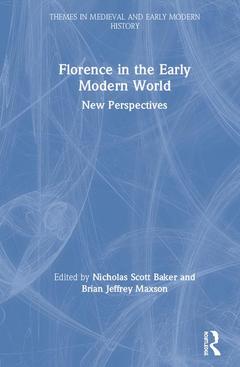Florence in the Early Modern World New Perspectives Themes in Medieval and Early Modern History Series
Auteurs : Scott Baker Nicholas, Maxson Brian J.

Florence in the Early Modern World offers new perspectives on this important city by exploring the broader global context of the fifteenth and sixteenth centuries, within which the experience of Florence remains unique.
By exploring the city?s relationship to its close and distant neighbours, this collection of interdisciplinary essays reveals the transnational history of Florence. The chapters orient the lenses of the most recent historiographical turns perfected in studies on Venice, Rome, Bologna, Naples, and elsewhere towards Florence. New techniques, such as digital mapping, alongside new comparisons of architectural theory and merchants in Eurasia, provide the latest perspectives about Florence?s cultural and political importance before, during, and after the Renaissance. From Florentine merchants in Egypt and India, through actual and idealized military ambitions in the sixteenth-century Mediterranean, to Tuscan humanists in late medieval England, the contributors to this interdisciplinary volume reveal the connections Florence held to early modern cities across the globe.
This book steers away from the historical narrative of an insular Renaissance Europe and instead identifies the significance of other global influences. By using Florence as a case study to trace these connections, this volume of essays provides essential reading for students and scholars of early modern cities and the Renaissance.
1. Where in the World is Renaissance Florence? Challenges for the History of the City After the Global Turn; Part 1: Economic Perspectives; 2. Taking Architectural Theory on the Road: The Sliding Scales of the Florentine Traveler; 3. "Tutto il mondo è paese": Locating Florence in Premodern Eurasian Commerce; 4. Mapping Gendered Labor in the Textile Industry of Early Modern Florence; 5. Shaping the City and the Landscape: Politics, Public Space, and Innovation under Ferdinando I de’ Medici; Part 2: Political Perspectives; 6. Nelle parti di Romagna: The Role and Influence of the Apennine Lords in Italian Renaissance Politics; 7. The Advantages of Stability: Medici Tuscany’s Ambitions in the Eastern Mediterranean; 8. The Medici, Maritime Empire, and the Enduring Legacy of the Cavalieri di Santo Stefano; Part 3: Cultural Perspectives; 9. Poggio’s Beginnings at the Papal Curia: The Florentine Brain Drain and the Fashioning of the Humanist Movement; 10. The Myth of the Renaissance Bubble: International Culture and Regional Politics in Fifteenth-Century Florence; 11. New Perspectives on Patria: The Andreini Performance of Florentine Citizenship
Nicholas Scott Baker is Senior Lecturer in early modern history at Macquarie University, Australia. He is the author of The Fruit of Liberty: Political Culture in the Florentine Renaissance, 1480–1550 (2013) and is completing a book on how Italians thought about the future during the Renaissance.
Brian Jeffrey Maxson is Associate Professor of History at East Tennessee State University, USA. He is the author of The Humanist World of Renaissance Florence (2014) and is currently working on a study of the distinction and manipulation of private and public conceptions in Renaissance Italy.
Date de parution : 06-2019
15.6x23.4 cm
Date de parution : 07-2019
15.6x23.4 cm
Thème de Florence in the Early Modern World :
Mots-clés :
Young Man; Renaissance Italy; Philip III; Mediterranean; Jeanne De Laval; Ottomans; Giovan Battista Andreini; Venice; Pope Paul III; Rome; Salone Dei Cinquecento; historiography; Grand Duke; art history; Medici Grand Dukes; East Asia; Cosimo II; North Africa; Grand Duke Ferdinando; Islamic world; Galley Slave; Late Medieval; Poggio Bracciolini; Travel; Rinaldo Degli Albizzi; Merchants; Pietro Tacca; Eurasia; Coluccio Salutati; mapping; Grand Duchy; gender; Palazzo Pitti; early modern cities; Piazza Della Signoria; Tuscan humanists; De Temporibus; sixteenth-century Mediterranean; Isabella Andreini; late medieval England; Tutto Il Mondo; Renaissance Florence; Tuscan City; Scriptor Apostolicus; Kanara Coasts; Studia Humanitatis



